|
|
|
Sort Order |
|
|
|
Items / Page
|
|
|
|
|
|
|
| Srl | Item |
| 1 |
ID:
164689
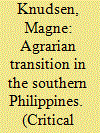

|
|
|
|
|
| Summary/Abstract |
On the southern Philippine island of Mindanao, scholars have documented a precarious land tenure, livelihood, and security situation for many smallholders. Agrarian political economy studies provide insightful analyses of the underlying causes of much poverty and violence on the island. Less attention has been given to cases of smallholder success. This article proposes that conditions for smallholder farming, even among ethnic minority groups, are more varied across the island than the literature suggests. In upland villages of north-central Mindanao, agrarian transition is a multi-directional process that produces different outcomes among households, kin groups, and villages. The main case study is a thriving mixed swidden and fixed field Maranao-Muslim farming village. Almost all the households in the village have successfully claimed land as their own and diversified and improved their livelihoods in recent times. To explain these positive outcomes, the article uses a relational approach and draws on anthropological literature on kinship, land tenure, and place to assess the bargaining power of smallholders in land deals. A stronger cross-fertilization of key insights in agrarian political economy and anthropological literature on kinship enriches the debate on agrarian transition in the southern Philippines.
|
|
|
|
|
|
|
|
|
|
|
|
|
|
|
|
| 2 |
ID:
175116
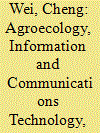

|
|
|
|
|
| Summary/Abstract |
As a bottom-up, grassroots paradigm for sustainable rural development, agroecology is particularly promising for smallholders in many countries in sub-Saharan Africa. However, by adopting agroecology, smallholders will be challenged to take on new perspectives and compile and integrate different sourced information to innovate. Today’s fast evolving information and communications technology in sub-Saharan Africa represents great opportunities for rural populations to enhance the adoption and success of agroecology and to address their daunting challenges simultaneously while conserving, protecting and enhancing natural resources. Agroecology combined with information and communications technology will probably be smallholders’ “precision agriculture” in many developing countries to enhance their food security and livelihood.
|
|
|
|
|
|
|
|
|
|
|
|
|
|
|
|
| 3 |
ID:
088013
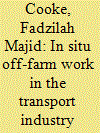

|
|
|
|
|
| Publication |
2009.
|
| Summary/Abstract |
This paper examines the informal transport sector within the smallholder oil palm economies of Kinabatangan and Lahad Datu areas of eastern Sabah by looking at the metaphoric border that is constructed between licit and illegal activities that take place on roads. It describes the work of two groups of drivers, namely, those who are themselves smallholders who provide a crucial service to the community in getting their fresh fruit bunches to mills on time; and the piret (pirate) taxis who transport passengers including foreign nationals, some of whom are illegal workers. Many have been driving for some time, thereby challenging the notion about off-farm work as providing a temporary safety net to smallholders. Drivers whose permits may be current may have used illegal means (such as meminggir - logging without licence), to accumulate the initial funds for acquiring their vehicles and necessary permits. Moreover, their clients are unconcerned about their 'illegal' status. Consequently, this paper maintains that there is no agreed-upon norms about legality/illegality, and law enforcement being uneven, the zone in which drivers operate is a fluid one.
|
|
|
|
|
|
|
|
|
|
|
|
|
|
|
|
| 4 |
ID:
120233
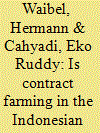

|
|
|
|
|
| Publication |
2013.
|
| Summary/Abstract |
This paper assesses the impact of contract farming in the oil palm industry in Indonesia on smallholders' well-being and investigates its implication for poverty reduction. Data were collected using random sampling from 245 smallholders in the province of Jambi, Sumatra. A treatment effects model was applied in order to capture endogeneity and selection bias. Results show that participation in contract farming is significantly associated with type of household, age of household head, size of oil palm plot, and the time of plantation establishment. While contract farming has a significant positive effect on smallholder income overall, it discriminates against poorer smallholders. It is recommended that the agro industry and government review contractual arrangements in order to increase the chances of the poor benefiting from oil palm expansion in Indonesia.
|
|
|
|
|
|
|
|
|
|
|
|
|
|
|
|
| 5 |
ID:
147456
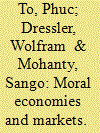

|
|
|
|
|
| Summary/Abstract |
Vietnam's uplands have been increasingly integrated into commodity production for global markets. This paper focuses on the role of the cassava trader in connecting upland villagers as cassava producers to an emerging global cassava market. In Vietnam's Central Highlands, ethnic minority villagers engaging in a mixed economy of subsistence and cash crop production still practice communal resource use and reciprocal labour arrangements – customs associated with the (contested) notion of ‘moral economy’. In this context, traders have strategically traversed the insider–outsider divide, enlisting trust and reciprocity to extend the patron–client relationship between traders and villagers. In the absence of state support for upland communities, these traders have embedded themselves within village social relations through the provision of multiple goods and services, including loans. Villagers turn to these traders during times of hardship through degrees of mutual dependence in often unequal trade relations. The ‘benevolence’ of the traders, however, is an explicit strategy to legitimise their economic benefits. The relationship is deepened because traders fill a vacuum in state services by providing technical support to farmers cultivating cassava. Beyond benefiting themselves, in their status as community ‘insiders’, traders promote market penetration into the uplands with associated social and environmental implications.
|
|
|
|
|
|
|
|
|
|
|
|
|
|
|
|
| 6 |
ID:
109123
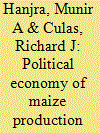

|
|
|
|
|
| Publication |
2011.
|
| Summary/Abstract |
Poverty and food security are endemic issues in much of sub-Saharan Africa. To eradicate extreme poverty and hunger in the region remains a key Millennium Development Goal. Many African governments have pursued economic reforms and agricultural policy interventions in order to accelerate economic growth that reduces poverty faster. Agricultural policy regimes in Zambia in the last 50 years (1964-2008) are examined here to better understand their likely impact on food security and poverty, with an emphasis on the political economy of maize subsidy policies. The empirical work draws on secondary sources and an evaluation of farm household data from three villages in the Kasama District of Zambia from 1986/87 and 1992/93 to estimate a two-period econometric model to examine the impact on household welfare in a pre- and post-reform period. The analysis shows that past interventions had mixed effects on enhancing the production of food crops such as maize. While such reforms were politically popular, it did not necessarily translate into household-level productivity or welfare gains in the short term. The political economy of reforms needs to respond to the inherent diversity among the poor rural and urban households. The potential of agriculture to generate a more pro-poor growth process depends on the creation of new market opportunities that most benefit the rural poor. The state should encourage private sector investments for addressing infrastructure constraints to improve market access and accelerate more pro-poor growth through renewed investments in agriculture, rural infrastructure, gender inclusion, smarter subsidies and regional food trade. However, the financing of such investments poses significant challenges. There is a need to address impediments to the effective participation of public private investors to generate more effective poverty reduction and hunger eradication programmes. This article also explores the opportunities for new public-private investments through South-South cooperation and Asia-driven growth for reducing poverty in Zambia.
|
|
|
|
|
|
|
|
|
|
|
|
|
|
|
|
| 7 |
ID:
106698
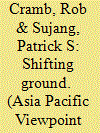

|
|
|
| 8 |
ID:
142637
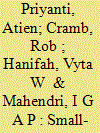

|
|
|
|
|
| Summary/Abstract |
Despite its small area and intensively cropped landscape, East Java accounts for 30% of Indonesia's cattle population. About two million households draw on family labour to raise cattle in backyard sheds and small enclosures, largely for cash income. In this paper, we examine the opportunity for such small-scale producers to benefit from Indonesia's economic transformation, given the rising urban demand for beef. The paper reports on a study in two contrasting sites in East Java – irrigated lowlands and rainfed uplands – to explore the constraints facing small-scale cattle producers in these environments, the means by which they have adapted to these constraints (especially by going beyond the farm household to access feed supplies) and possible means to enhance their production systems and incomes. The findings suggest that such cattle production systems can provide a viable source of livelihood, even for resource-poor households; hence, appropriately adapted cattle improvement programmes are a sensible component of a pro-poor development strategy.
|
|
|
|
|
|
|
|
|
|
|
|
|
|
|
|
| 9 |
ID:
112270
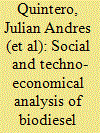

|
|
|
|
|
| Publication |
2012.
|
| Summary/Abstract |
Peru has introduced a law to promote the use of biofuels with the objective to increase employment, strengthening agriculture development, providing an economic alternative to illegal drug production. In this work, the costs of biodiesel production from oil palm and Jatropha were analyzed under different scenarios. They include the participation of associations of smallholders and commercial producers as raw material provides in biodiesel business in Peru. The scenarios considered have a strong social dimension in which they explicitly consider how productions' costs change when smallholders supply a proportion of the feedstock to the industry. Production cost profiles were generated using the chemical process simulation and economical evaluation software packages provided by Aspen Technology. Total production cost found for oil palm biodiesel production ranged between 0.23 and 0.31 USD/L and Jatropha biodiesel production costs were between 0.84 and 0.87 USD/L. These production costs were analyzed and compared to biodiesel ex-factory prices and diesel fuel production cost factors. The results suggest that including smallholders in the supply chain can be under some conditions competitive with liquid biofuel production systems that are purely large scale.
|
|
|
|
|
|
|
|
|
|
|
|
|
|
|
|
|
|
|
|
|